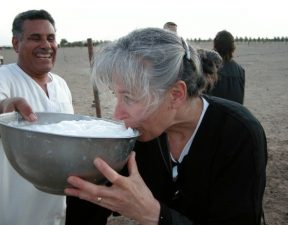Miriam has been covering a series of sustainable meal recipes from the Middle East region, from countries like Saudi Arabia, Jordan and Iran to help people reconnect with their local food (click the countries to get some great local recipes).
We know that food industry is shaping the future of our bodies and our planet, and not in the best way. When you last tucked into dinner, did you pay any attention to where the ingredients came from? What’s on your plate? Where does it come from? The documentary Sustainable Table: What’s On Your Plate looks into the food we eat. While the film covers what’s going on in America the lesson can be applied to our global village, patterning itself on the West.
For Sustainable Table: What’s On Your Plate, director Mischa Hedges traveled along America’s west coast to learn more about our food system, and his findings apply globally.
Modern agriculture is waging a war against the planet, attacking nature with pesticides, herbicides, fertilizers, monoculture and genetically modified organisms. Learn what you can do to help stop it.
The film serves up these unsavory stats:
- 7 percent of farms now sell 75% of our food
- Agricultural runoff is a primary river pollutant, poisoning groundwater and killing entire ecosystems
- Epidemic obesity, diabetes, and heart disease are directly linked to changes in food production
- Over the last half century, agricultural exploitation and pollution have caused massive ecological degradation; 60% of earth’s ecosystems are sustained only through human intervention
Modern methods of commercial food production don’t consider environmental or human health costs when calculating bottom line. Monoculture is the practice of continually growing on the same land a single, high-yield crop: corn, soybeans and wheat are common monoculture crops. Sure it’s efficient and a better bang for your farming buck, but over the past century, massive monoculture has:
- Reduced the diversity of soil nutrients
- Destroyed biodiversity
- Increased dependency on chemical pesticides and fertilizers
- Increased reliance on specialized farm equipment dependent on fossil fuels
Polyculture (rotation of livestock and crops) evolved over centuries to meet a local community’s complete food needs. It can naturally replenish what’s consumed in the growing process by re- using byproducts of animal husbandry. When manure is direct-deposited onto fields by livestock, or purposely gathered and spread by farmers, the enriched soils help fertilize crops which are then consumed by humans and animals alike. This eat/poop process returns critical phosphorus returned to the soil, a natural continuum.
Modern agriculture treats animals as commodities rather than living beings, exposing livestock to mental and physical anguish, dosing them with growth hormones and antibiotics and raising them in overcrowded conditions. Large scale animal breeding facilities (called concentrated animal feeding operations – CAFOs) generate foul emissions, which are linked to heart disease, neurological problems and asthma in nearby human populations. Animal waste runoff from these facilities is a leading contaminant of drinking water.
CAFOs are promoted as the best route to large-scale food production, but their “efficiency” comes by replacing pasture-grazing with meal made from government-subsidized crops, completely altering the animals’ natural diets, with negative consequences for both animal and human health.
According to health website Mercola.com, farm subsidies underpin our unhealthy modern diet by supporting high-fructose corn syrup, fast food, animal factories, and monoculture. Non-profit watchdog U.S. PIRG issued a stunning report translating federal subsidies of junk food versus fresh produce into easily understood terms: if you received the same annual subsidy a s Big Food Business, you’d get $7.36 to spend on junk food and 11 cents for fresh produce.
We vote every day when we choose our food. Will you vote for the system that is systematically destroying your health, animal welfare and the planet? Or will you opt for sustainable change?
What can you do to help? This film tries to find some of the answers.




